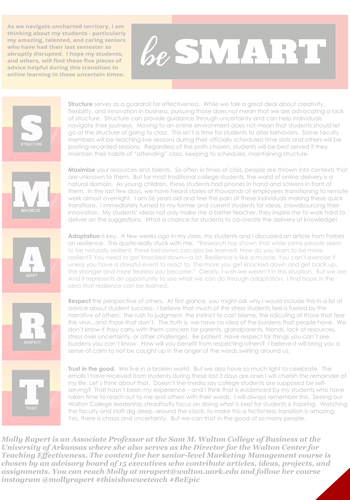A Time to Be Smart

March 16, 2020 | By Molly Rapert
As we navigate uncharted territory, I am thinking about my students — particularly my amazing, talented and caring seniors who have had their last semester so abruptly disrupted. I hope my students, and others, will find these five pieces of advice helpful during this transition to online learning in these uncertain times.
Structure
Structure serves as a guardrail for effectiveness. While we talk a great deal about creativity, flexibility, and innovation in business, pursuing those does not mean that we are advocating a lack of structure. Structure can provide guidance through uncertainty and can help individuals navigate their journeys. Moving to an online environment does not mean that students should let go of the structure of going to class. This isn’t a time for students to alter behaviors. Some faculty members will be teaching live sessions during their officially scheduled time slots and others will be posting recorded sessions. Regardless of the path chosen, students will be best served if they maintain their habits of “attending” class, keeping to schedules, maintaining structure.
Maximize
Maximize your resources and talents. So often in times of crisis, people are thrown into contexts that are unknown to them. But for most traditional college students, the world of online delivery is a natural domain. As young children, these students had phones in hand and screens in front of them. In the last few days, we have heard stories of thousands of employees transitioning to remote work almost overnight. I am 56 years old and feel the pain of these individuals making these quick transitions. I immediately turned to my former and current students for ideas, crowdsourcing their innovation. My students’ ideas not only make me a better teacher, they inspire me to work hard to deliver on the suggestions. What a chance for students to co-create the delivery of knowledge!
Adapt
Adaptation is key. A few weeks ago in my class, my students and I discussed an article from Forbes on resilience. This quote really stuck with me: “Research has shown that while some people seem to be naturally resilient, these behaviors can also be learned. How do you learn to be more resilient? You need to get knocked down—a lot. Resilience is like a muscle. You can’t exercise it unless you have a stressful event to react to. The more you get knocked down and get back up, the stronger and more fearless you become.” Clearly, I wish we weren’t in this situation. But we are. And it represents an opportunity to see what we can do through adaptation. I find hope in the idea that resilience can be learned.
Respect
Respect the perspective of others. At first glance, you might ask why I would include this in a list of advice about student success. I believe that much of the stress students feel is fueled by the narrative of others: the rush to judgment, the instinct to cast blame, the ridiculing of those that fear this virus...and those that don’t. The truth is, we have no idea of the burdens that people have. We don’t know if they carry with them concern for parents, grandparents, friends, lack of resources, stress over uncertainty, or other challenges. Be patient. Have respect for things you can’t see, burdens you can’t know. How will you benefit from respecting others? I believe it will bring you a sense of calm to not be caught up in the anger of the words swirling around us.
Trust
Trust in the good. We live in a broken world. But we also have so much light to celebrate. The emails I have received from students during these last three days are ones I will cherish the remainder of my life. Let’s think about that. Doesn’t the media say college students are supposed be self-serving? That hasn’t been my experience – and I think that is evidenced by my students who have taken time to reach out to me and others with their words. I will always remember this. Seeing our Walton College leadership steadfastly focus on doing what is best for students is inspiring. Watching the faculty and staff dig deep, around the clock, to make this a frictionless transition is amazing. Yes, there is chaos and uncertainty. But we can trust in the good of so many people.


